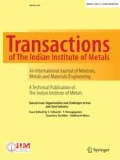 This special issue of Transactions of Indian Institute of Metals (Trans IIM) is dedicated to Professor Arun Kumar Biswas. An alumnus of Calcutta University (M.Sc. Tech, 1955 and Ph.D., 1959) and the Massachusetts Institute of Technology (MIT), USA (Masters in Metallurgy, 1962), Professor Biswas served as a faculty member at the Indian Institute of Technology, Kanpur (IITK), in the Department of Metallurgical Engineering from 1963 to 1995. He was introduced to mineral engineering by his thesis adviser at MIT, the legendary Professor A. M. Gaudin. Inspired by him, Professor Biswas passionately worked all though his life for the promotion of mineral engineering as an important engineering discipline in its own right. Author of over 150 technical papers and 25 monographs and edited multi-authored volumes, Professor BiswasFootnote 1 is well known for his pioneering contributions in several diverse fields: History of Science, Applied Chemistry, Mineral Engineering, Languages and Literature and, History of Religion. His monumental work (two volumes) on Minerals and Metals in Ancient India, co-authored with his wife, Dr. Sulekha Biswas, a Sanskrit scholar, is a testimony of his scientific rigor and scholarship. The goal of his research in mineral engineering was to find innovative means of beneficiating several complex and/or low-grade Indian mineral deposits, such as monazite beach sand, zircon, molybdenite, diamond, phosphorites, zinc ferrite, zinc tailings and residues, alumina-rich iron ore slimes, pyrite, Kudremukh iron ore tailing, deep sea manganese nodules, tungsten deposits and separation amongst calcium minerals.
This special issue of Transactions of Indian Institute of Metals (Trans IIM) is dedicated to Professor Arun Kumar Biswas. An alumnus of Calcutta University (M.Sc. Tech, 1955 and Ph.D., 1959) and the Massachusetts Institute of Technology (MIT), USA (Masters in Metallurgy, 1962), Professor Biswas served as a faculty member at the Indian Institute of Technology, Kanpur (IITK), in the Department of Metallurgical Engineering from 1963 to 1995. He was introduced to mineral engineering by his thesis adviser at MIT, the legendary Professor A. M. Gaudin. Inspired by him, Professor Biswas passionately worked all though his life for the promotion of mineral engineering as an important engineering discipline in its own right. Author of over 150 technical papers and 25 monographs and edited multi-authored volumes, Professor BiswasFootnote 1 is well known for his pioneering contributions in several diverse fields: History of Science, Applied Chemistry, Mineral Engineering, Languages and Literature and, History of Religion. His monumental work (two volumes) on Minerals and Metals in Ancient India, co-authored with his wife, Dr. Sulekha Biswas, a Sanskrit scholar, is a testimony of his scientific rigor and scholarship. The goal of his research in mineral engineering was to find innovative means of beneficiating several complex and/or low-grade Indian mineral deposits, such as monazite beach sand, zircon, molybdenite, diamond, phosphorites, zinc ferrite, zinc tailings and residues, alumina-rich iron ore slimes, pyrite, Kudremukh iron ore tailing, deep sea manganese nodules, tungsten deposits and separation amongst calcium minerals.
During the process of finalizing the technical program of the International Conference on Mineral Processing Technology (MPT 2016) we received the sad news of the demise of Professor Arun Kumar Biswas, one of the founding members of IIME, on November 30, 2015 at his residence in Kolkata. As a mark of respect and tribute to Professor Biswas, the organizing committee of MPT 2016 decided to organize a special plenary session dedicated to his memory, as a part of its proceedings. A decision was also taken to bring out this special issue. MPT 2016 was organized in January 2016 at Pune, by Tata Research Design and Development Centre (TRDDC), a division of Tata Consultancy Services (TCS), under the auspices of the Indian Institute of Mineral Engineers (IIME). Eminent speakers who paid rich tributes to the accomplishments of Professor Biswas included his erstwhile colleagues at IIT Kanpur—E. C. Subbarao, T. R. Ramachandran and B. K. Mishra, professional contemporaries—S. Ranganathan and K. A. Natarajan, first Ph.D. student S. G. Dixit, former graduate student and research collaborator Pradip and, his only child, Sandipan Biswas.
We are happy to place before you this special commemorative issue in honor of Professor Biswas, which consists of 26 technical articles covering various aspects of mineral processing, extractive metallurgy and archaeometallurgy and contributed by several well-wishers, former colleagues, students and close associates of Professor Biswas. It will be formally released during the inaugural session of the next annual technical meeting of IIME, that is, MPT 2017, being hosted by the IIME Tamil Nadu Chapter at Mahabalipuram, Chennai on February 1, 2017.
We are indeed grateful to all the contributors of this commemorative issue for their sincere efforts in preparing the manuscripts and their kind help and enthusiastic support in meeting the various deadlines. We express our sincere thanks to Professor K. Bhanu Sankara Rao, the Chief Editor, Transactions IIM, who very kindly agreed to our request to publish this commemorative issue. We would like to place on record our appreciation to all our anonymous reviewers for their critical inputs, prompt help and support. The constant encouragement and valuable suggestions from Dr. R. Sandhya, Editorial Manager, Transactions IIM and Mr. Satish Srinivasan of Springer are sincerely acknowledged. We gratefully acknowledge the help and support from the management of our respective organizations for allowing us to devote adequate time and efforts to bring out this special issue in time.
Notes
For a detailed bio-sketch of Professor Biswas, please refer to https://en.wikipedia.org/wiki/Arun_Kumar_Biswas.
Author information
Authors and Affiliations
Corresponding author
Rights and permissions
About this article
Cite this article
Pradip, Kumar, R., Rai, B. et al. Preface. Trans Indian Inst Met 70, 251–252 (2017). https://doi.org/10.1007/s12666-017-1039-4
Received:
Accepted:
Published:
Issue Date:
DOI: https://doi.org/10.1007/s12666-017-1039-4

